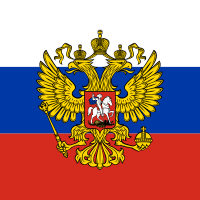Federal Antimonopoly Service
The Federal Antimonopoly Service of Russia (FAS) (Russian: Федеральная антимонопольная служба России, ФАС России) is the federal-level executive governmental organ that controls the execution of the antitrust law and related areas. It is headed by Igor Artemyev.[1]
It was established by the Decree of President of Russia #314 by March 9, 2004.[2]
In July 2015, on a proposal of the Prime-Minister of Russia Dmitry Medvedev President Vladimir Putin approved the merger of the Federal Tariffs Service with the FAS Russia, adding thus to the competences of the latter mandate with price and tariff regulation, regulation of electricity tariffs, gas prices and certain other tariffs and some functions of natural monopoly regulation.[3]
Organization
Among the departments of the FAS Central authority there are:
- Department for Control over Construction and Natural Resources
- Department for Industry Control
- Department for Regulation over Electric Power Industry
- Department for Regulation of Telecommunications and Information Technologies
- Department for Control over Financial Markets
- Department for Control over Advertising and Unfair Competition
- Department for Control over Foreign Investment
- Anti-Cartel Department
- Department for Control over Army and Naval Armaments, Military Communications Equipment
- and others[4]
International Cooperation
The FAS Russia cooperates with international organizations and foreign authorities in the sphere of the antimonopoly policy, combating unfair competition practices and governmental regulation of natural monopolies.
The international activity of the FAS Russia includes:
- Contribution to integration of the Russian economy into the global economic area;
- Realization of economic liabilities of the Russian Federation on issues, related to the competence of the FAS Russia;
- Participation in development of conception of united European economic space;
- Protection of Russian interests by participation in field-oriented international organizations;
- Implementation of the best foreign experience to the Russian practice, advanced training of employees of the FAS Russia;
- Preparation and realization of technical assistance from international organizations on behalf of the FAS Russia
The FAS Russia participates in International Working Groups. On its initiative 3 groups were created:
- Working Group on Investigatory Issues of Pricing in Oil and Oil Product Markets and Methods of Their Functioning (the Working Group on oil) – was created in cooperation with the Austrian Federal Competition Authority in 2011 and closed down in 2014 since all its goals were achieved;
- International Working Group on Research of Competition Issues in the Market of International Telecommunications (Roaming) – was created in 2012 for the purpose of meeting the Recommendations for Developing Markets of International Telecommunications in the CIS Member-States contained in the Report on the State of Competition in the CIS Mobile Communication Markets;
- International Working Group for Studying Competition Problems on Pharmaceutical Sector – was created in cooperation with the Italian Competition Authority in 2012; aimed at elaboration of specific proposals on forming the competition environment in the pharmaceutical market and ensuring the availability of medicines to the consumers.
The FAS Russia has established ties and participates in the work of the Organization of Economic Cooperation and Development (OECD), Interstate Council for Antimonopoly Policy (ICAP) uniting 10 CIS Countries and Ukraine, United Nations Conference on Trade and Development (UNCTAD), Eurasian Economic Union (EEU), International Competition Network (ICN), BRICS, European Union (basing on the Agreement on partnership and cooperation between Russia and the EU entered into force in 1997), Asia-Pacific Economic Cooperation (APEC), Energy Regulators Regional Association (ERRA).[5]
To enhance international cooperation in the competition field, the FAS Russia holds annually the event “Russian Competition Week” which in 2015 gathered heads of competition authorities of the countries all across the globe and was attended by Vladimir Putin.[6]
Prominent cases
a) Google
On September 14, 2015 the FAS Russia's Commission arrived to the conclusion on abuse by the Google group of companies of its dominant position on the market of pre-installed application stores, based on investigating the case against Google Inc, Google Ireland Ltd., Google Ltd., following the Russian Internet company Yandex' complain that Google’s search engine was compulsorily installed as the default on mobile devices and that its icons enjoyed preferential placement on the screen. To restore competition on the market, Google, in accord with the FAS Russia's determination, must adjust its contracts with mobile devices vendors within a month – exclude anticompetitive requirements from the contracts that restrict installing applications and services of other vendors.[7]
See also
References
- ↑ Federal Antimonopoly Service website
- ↑
- ↑
- ↑
- ↑
- ↑
- ↑ https://www.rt.com/news/317732-google-monopoly-fas-russia/. Missing or empty
|title=(help)

